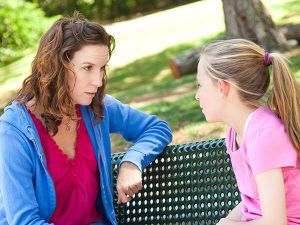Difference between revisions of "About-cancer/coping/adjusting-to-cancer/talk-to-children/zh"
Jump to navigation
Jump to search
(Created page with "有关与孩子交谈的更多详细信息和与年龄有关的技巧,您的家人和朋友可能会发现阅读NCI小册子《当您所爱的人正在接受癌症治疗时...") |
|||
| (32 intermediate revisions by the same user not shown) | |||
| Line 20: | Line 20: | ||
*科学家正在发现许多治疗癌症的新方法。 | *科学家正在发现许多治疗癌症的新方法。 | ||
| − | ''' | + | '''关于家庭癌症患者''' |
| − | * | + | *您的孩子并不孤单。 其他孩子的父母患有癌症。 |
| − | * | + | *生气,生气或害怕都可以。 |
| − | * | + | *您的孩子无法采取任何措施来改变您患有癌症的事实。 |
| − | * | + | *家庭成员可能会因为担心您而采取不同的行动。 |
| − | * | + | *无论您发生什么事情,您都将确保您的孩子得到照顾。 |
| − | + | 关于他们可以做什么 | |
| − | * | + | *他们可以通过做一些不错的事情来帮助您,例如洗碗,打扫房间甚至为您画画。 |
| − | * | + | *他们仍应上学并参加体育运动和其他有趣的活动。 |
| − | * | + | *他们可以与其他成年人交谈,例如老师,家庭成员以及宗教或精神领袖。 |
| − | === | + | ===患癌症时孩子如何行事 === |
| − | + | 儿童可以多种方式对癌症做出反应。 例如,他们可能: | |
| − | * | + | *感到困惑,害怕,孤独或不知所措 |
| − | * | + | *感到内,并认为他们的所作所为或引起您的癌症 |
| − | * | + | *当他们被要求安静或在房子周围做更多的家务时,会感到生气 |
| − | * | + | *错过了他们习惯获得的关注 |
| − | * | + | *像年轻时一样退步并表现 |
| − | * | + | *在学校或家里遇到麻烦 |
| − | * | + | *固执,害怕离开家 |
| − | * | + | *了解有什么可以帮助家庭成员患癌症的儿童和青少年。 |
| − | === | + | === 青少年=== |
| − | + | 如果您有个十几岁的孩子,请知道他们正处在他们试图脱离父母并独立于父母的生活中。 尝试让他们谈论自己的感受并提出问题。 尽可能多地告诉他们有关您的癌症的信息。 向他们征求意见,并在可能的情况下让他们帮助您做出决定。 | |
| − | + | 青少年可能想在生活中与其他人交谈。 朋友可以成为他们支持的重要来源,尤其是那些家人中也有严重疾病的朋友。 其他家庭成员,老师,教练和精神领袖也可以提供帮助。 鼓励您的青少年与他们信任的人谈论他们的恐惧和感受。 | |
| − | + | 有关支持青少年的更多信息,你会发现它有助于分享这本电子书当你的父母有癌症:一个指南与他们十几岁。 | |
| − | === | + | === 成年儿童=== |
| − | + | 如果您有成年子女,那么一旦您患有癌症,与您的关系可能会改变。 你可以: | |
| − | * | + | *请他们帮助做出医疗决定,支付账单或照料房屋 |
| − | * | + | *请他们解释医疗信息 |
| − | * | + | *需要他们和您一起去看医生或买药 |
| − | * | + | *依靠他们的情感支持 |
| − | * | + | *当他们帮助您进行身体护理时感到尴尬 |
| − | + | 对于某些父母来说,可能很难向成年子女寻求安慰和照顾。 但是,与家人讨论癌症很重要,即使他们感到不安或担心您。 在谈论您的治疗方法时,尝试包括他们。 让他们知道您希望他们对自己的护理做出的选择,以防您病得太重而无法自己做出选择。 (请参阅预先指示。)认识到您的孩子可能很难进行这次演讲,并且像您一样,他们正在努力适应您的疾病。 | |
| − | + | 有关与孩子交谈的更多详细信息和与年龄有关的技巧,您的家人和朋友可能会发现阅读NCI小册子《当您所爱的人正在接受癌症治疗时》很有帮助。 | |
Latest revision as of 21:17, 31 October 2019
与孩子谈论您的癌症
即使您的孩子在得知您的癌症时会感到沮丧,也不要假装一切都好。 甚至很小的孩子也可以感觉到什么时候出了问题。 他们会看到您感觉不舒服,经常离开家,或者不能像以前那样花很多时间陪伴他们。 年仅18个月的儿童开始注意到周围发生的事情。 诚实很重要。 说实话比让他们想象最坏的情况要好。 给您的孩子一些时间来提问和表达他们的感受。
所有年龄段的孩子都需要知道什么
关于巨蟹座
- 您的孩子没有做过,没有想到或没有说过致癌的事情。
- 仅因为您患有癌症并不意味着您会死于癌症。 实际上,许多人患癌症的时间很长。
- 您的孩子不能使您康复。 但是他或她有一些方法可以使您感觉更好。
- 科学家正在发现许多治疗癌症的新方法。
关于家庭癌症患者
- 您的孩子并不孤单。 其他孩子的父母患有癌症。
- 生气,生气或害怕都可以。
- 您的孩子无法采取任何措施来改变您患有癌症的事实。
- 家庭成员可能会因为担心您而采取不同的行动。
- 无论您发生什么事情,您都将确保您的孩子得到照顾。
关于他们可以做什么
- 他们可以通过做一些不错的事情来帮助您,例如洗碗,打扫房间甚至为您画画。
- 他们仍应上学并参加体育运动和其他有趣的活动。
- 他们可以与其他成年人交谈,例如老师,家庭成员以及宗教或精神领袖。
患癌症时孩子如何行事
儿童可以多种方式对癌症做出反应。 例如,他们可能:
- 感到困惑,害怕,孤独或不知所措
- 感到内,并认为他们的所作所为或引起您的癌症
- 当他们被要求安静或在房子周围做更多的家务时,会感到生气
- 错过了他们习惯获得的关注
- 像年轻时一样退步并表现
- 在学校或家里遇到麻烦
- 固执,害怕离开家
- 了解有什么可以帮助家庭成员患癌症的儿童和青少年。
青少年
如果您有个十几岁的孩子,请知道他们正处在他们试图脱离父母并独立于父母的生活中。 尝试让他们谈论自己的感受并提出问题。 尽可能多地告诉他们有关您的癌症的信息。 向他们征求意见,并在可能的情况下让他们帮助您做出决定。
青少年可能想在生活中与其他人交谈。 朋友可以成为他们支持的重要来源,尤其是那些家人中也有严重疾病的朋友。 其他家庭成员,老师,教练和精神领袖也可以提供帮助。 鼓励您的青少年与他们信任的人谈论他们的恐惧和感受。
有关支持青少年的更多信息,你会发现它有助于分享这本电子书当你的父母有癌症:一个指南与他们十几岁。
成年儿童
如果您有成年子女,那么一旦您患有癌症,与您的关系可能会改变。 你可以:
- 请他们帮助做出医疗决定,支付账单或照料房屋
- 请他们解释医疗信息
- 需要他们和您一起去看医生或买药
- 依靠他们的情感支持
- 当他们帮助您进行身体护理时感到尴尬
对于某些父母来说,可能很难向成年子女寻求安慰和照顾。 但是,与家人讨论癌症很重要,即使他们感到不安或担心您。 在谈论您的治疗方法时,尝试包括他们。 让他们知道您希望他们对自己的护理做出的选择,以防您病得太重而无法自己做出选择。 (请参阅预先指示。)认识到您的孩子可能很难进行这次演讲,并且像您一样,他们正在努力适应您的疾病。
有关与孩子交谈的更多详细信息和与年龄有关的技巧,您的家人和朋友可能会发现阅读NCI小册子《当您所爱的人正在接受癌症治疗时》很有帮助。
